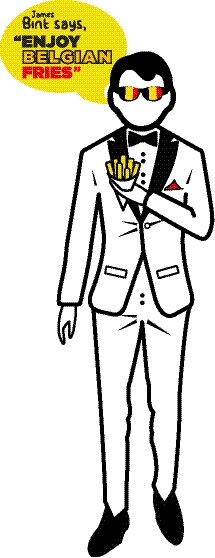
Friteries’ or snack kiosks selling freshly-cooked fries (chips), are very typically Belgian and therefore a sure symbol of Belgitude. With more than 5,000 friteries (also known as fritures or fritkots), Belgium is unique in the world. Almost every town, district and village has one, a place for people of all ranks, Walloon and Fleming alike, regulars as well as the casual passers-by to meet at almost any time of the day (and night) while standing in the queue for a steaming bag of fries. This is about so much more than just popular gastronomy.
The appetite for fries seems to be in the genes of every Belgian. For example, in many households there is a ‘fries day’, a fixed – almost ritual – day in the week when the family will go to the friterie. Often after a night out – a football match, a cycling competition or a concert – going to the friterie is the logical conclusion to a beautiful evening. Together or alone, in a paper cone or out of a cardboard box, using fingers or a fork, with mayonnaise or chilli-hot samourai sauce, accompanied by some Flemish beef stew or frikandel meatballs, at ‘Friture Billie and Kiki’ or ‘Maison Antoine’, everyone has their own preferences and their favourite friterie, which has been carefully selected based on the taste and crispness of the fries, its location, service and atmosphere.
Contrary to every kind of modern logic, a friterie should be low on frills and publicity, but full of personality and human warmth, as well as a touch of nostalgia. This bizarre phenomenon is the cornerstone of Belgian ‘fritkot culture’, a tradition that has existed for centuries, and which has been recognised in Belgium as a part of its intangible cultural heritage. It is something to cherish. Every year there is a national Belgian fries week; and in Bruges you can find the only museum in the world devoted to the Belgian fry. Belgians do not mind the ‘fries humour’, a genre mainly practised by the French and the Dutch to make fun of them. The only thing that might upset them, is that so many English speakers stubbornly continue to call Belgian fries, the ambassador of Belgian unity, ‘French’ fries ...
We also have a real-life Ambassador of Belgian Fries – James Bint, who owes his name to the bintje potato, one of the best for making frites. His mission? ‘A licence to fry!’
This article is an abstract from the book ".be our guest. The ambassadors of Belgian hospitality”.

